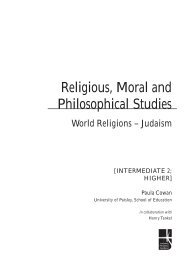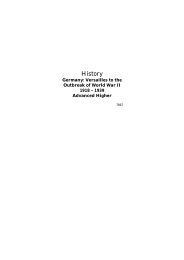Bertolt Brecht - Education Scotland
Bertolt Brecht - Education Scotland
Bertolt Brecht - Education Scotland
Create successful ePaper yourself
Turn your PDF publications into a flip-book with our unique Google optimized e-Paper software.
10<br />
THE TOP TEN<br />
Bartram, Graham, and Waine, Anthony (eds.), <strong>Brecht</strong> in Perspective, London:<br />
Longman, 1982<br />
A collection of essays aimed at an undergraduate audience though this should<br />
not put off an Advanced Higher student with a developing understanding of,<br />
and interest in, <strong>Brecht</strong>. It is undoubtedly a first-rate buy.<br />
The second section of the book is certainly the most productive. It handles<br />
the theatrical practice from its social and artistic complexities through to<br />
looking at the comparable and diverging methods used by the century’s two<br />
foremost theatrical theorists and practitioners – <strong>Brecht</strong> and Stanislavski. This<br />
latter chapter is by Margaret Eddershaw (see page 6) and should be a key text<br />
for directing options at Advanced Higher.<br />
A succinct chapter on <strong>Brecht</strong>’s great inspiration, Piscator, follows, examining<br />
their theatrical, political and personal relationship. This leads to a super<br />
essay, ‘<strong>Brecht</strong> and Cabaret’, which is detailed, informative and revealing as<br />
regards <strong>Brecht</strong>’s debt to this form of popular entertainment: a debt which runs<br />
through the development of Gestus, Verfremdung, use of music, staging,<br />
narrative structure and anti-naturalist presentational styles.<br />
As might be expected, the first section of the book treats the social, political,<br />
historical and artistic background from which <strong>Brecht</strong> sprang. There is a very<br />
good chapter on Epic theatre and a vital essay on comedy which examines<br />
<strong>Brecht</strong>’s insistence on Spass (fun) in the theatre.<br />
The book ends with a retrospective on <strong>Brecht</strong>’s legacy, both on Germanspeaking<br />
theatre and English theatre (unfortunately it is specifically English<br />
theatre and not British theatre). Like all the texts in this Top Ten which look<br />
at <strong>Brecht</strong>’s influence on theatre today, this is particularly important when<br />
students grapple with the demands of Outcome 2: ‘Explore the influence of<br />
two leading 20th-century theatre practitioners on current theatre practice’.<br />
Sacks, Glendyr, and Thomson, Peter (eds.), The Cambridge Companion to<br />
<strong>Brecht</strong>, Cambridge: CUP, 1994<br />
This is an extremely good companion, in the Top Ten due to its breadth and<br />
contemporaneity. Part of its strength is the mixture of contributions, ranging<br />
from both the academic sector’s view and the theatre practitioner’s angle.<br />
Again, all elements of <strong>Brecht</strong>’s life and work are covered, giving insights into<br />
the plays, the practice and the politics.<br />
One of the most interesting aspects of this book is how individual plays are<br />
picked up and examined in some detail. This makes it a useful tool for<br />
students taking as broad a sweep as possible through <strong>Brecht</strong>’s practice.<br />
DRAMA

















